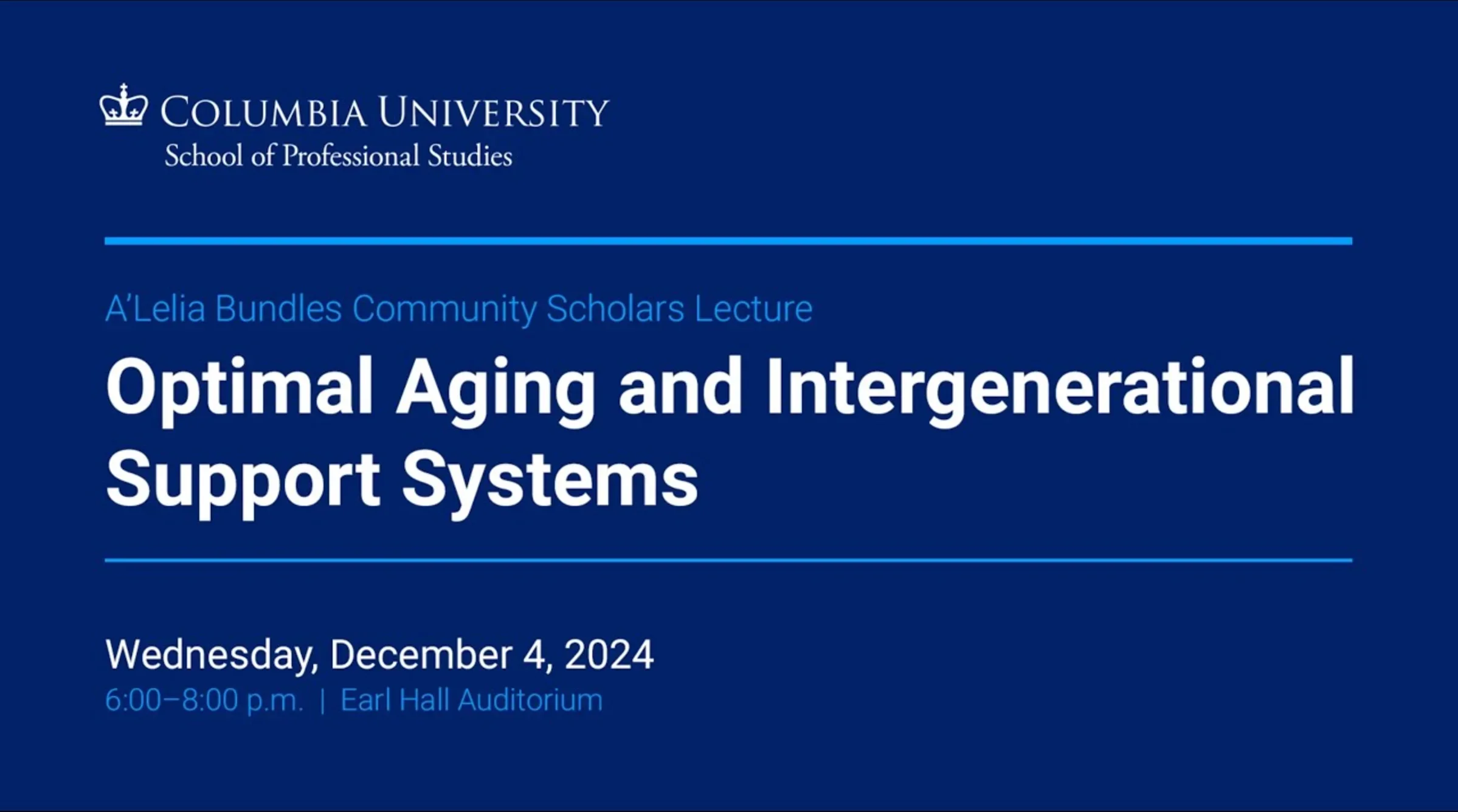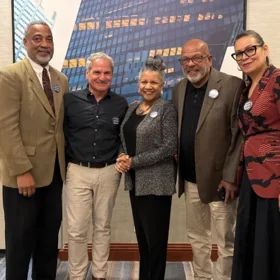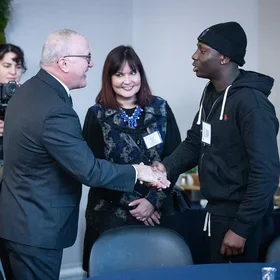“How do we live longer, better? And how do we co-create across the generational divide, a better way to age?” asked Chris Lawrence, an A’Lelia Bundles Community Scholar at Columbia University and community chaplain with InnerCHANGE East Harlem. Lawrence shared a genuine concern for the future of older New Yorkers. He maintained that facilitating intergenerational support systems will be essential to older generations’ living longer, more fulfilling lives.
Lawrence led the 17th A’Lelia Bundles Community Scholars public program, “Optimal Aging and Intergenerational Support Systems,” presented by the Columbia University School of Professional Studies (SPS) Community Programs and Office of Government and Community Affairs on December 3, 2024. Community members and health professionals gathered alongside Lawrence to supplement the conversation and draw on their experiences. Other speakers at the event included Dr. Daniel David, assistant professor at NYU Rory Meyers College of Nursing and National Palliative Care Center; Janna Heyman, professor and endowed chair of the Henry C. Ravazzin Center on Aging and Intergenerational Studies at Fordham University; Janicia Hyde, life enrichment supervisor at Vista on 5th; and Dr. Mark Nathanson, a geriatric psychiatrist at Irving Medical Center.
Through his experience as a pastor and community activist in East Harlem, Lawrence imagines a new kind of urban life for seniors. He sees every block as a village, where there are places to gather and where professionals, volunteers, and older adults help and learn from one another. “We are losing public space; people don’t meet intergenerationally. Most older adults crave intergenerational encounters, but it actually benefits both sides,” Lawrence said, emphasizing the pressing nature of this problem. “Every day until 2030, 10,000 people will be turning 65. In 10 years’ time, there will be twice as many people over 80 as there are currently. It’s a very significant challenge to think about the increased support this population will require.”
The speakers repeatedly stressed, in varying ways, that while intergenerational companionship can be hard to establish, when successful, it can lead to mutually beneficial relationships.

(l to r) Dr. Mark Nathanson, a geriatric psychiatrist at Irving Medical Center; Chris Lawrence, A’Lelia Bundles Community Scholar; Janna Heyman, professor and endowed chair of the Henry C. Ravazzin Center on Aging and Intergenerational Studies at Fordham University; Janicia Hyde, life enrichment supervisor at Vista on 5th; and Dr. Daniel David, assistant professor at NYU Rory Meyers College of Nursing and National Palliative Care Center. Photo credit: Michael DiVito
Dr. David said he conducted an informal survey asking older patients and younger family members what gives their lives meaning and found the results to be similar among young and old. The most common responses, he said: not being known by their limitations, feeling independent, and finding peace. “But the biggest thing is that they want to overcome challenges,” he said. Later in the panel, Janna Heyman shared that sentiment, noting connections with young people have been particularly helpful in enabling older generations to overcome tech challenges. Often, through the process, both sides find benefits, whether it’s exploring history or sharing stories online. “Intergenerational technology programs should be expanded,” she said.
Hyde supplemented the conversation, listing the activities her residents find valuable in the structured visits they organize with younger volunteers, including things that spur memories (trivia, old songs, old movies) as well as games, puzzles, conversations, and activities that keep them “involved and active.”
Volunteers and professionals working in mental health care for older adults should be better recognized and encouraged, according to Dr. Nathanson. He’s one of only 55 geriatric psychologists in the United States and noted that the field is shrinking, largely because it generally pays less than other jobs in the field. But, he added, he points out to associates that they often provide geriatric psychological support even if they don’t have the title. “Human-to-human contact is mental health care,” he said.
A lively question-and-answer period engaged the large in-person and online audience and local community leaders, including representatives from Lifeforce in Later Years (LILY); the nearby naturally occurring retirement community (NORC) Bloomingdale Aging in Place; and SPS founding dean Frank World, who leads Emeritus Professors in Columbia (EPIC). One audience member asked how intergenerational relationships might look during end-of-life conversations and preparations. Dr. David responded, “What you bring up is a very important question that people have a hard time talking about. … What those conversations can be built around is, what brings your life joy, what brings your life value, can you connect with it?”
“The need for companionship and support networks exists among both older and younger people, especially given increased isolation due to technologies including social media,” said George Calderaro, senior associate director of auditing and community programs at SPS, who started the A’Lelia Bundles Community Scholars Lecture Series in 2016. “This was an important program which brought together professionals in the fields of medicine and social work as well as nonprofit leaders working in Columbia communities on the Upper West Side and Harlem both online and in the audience.”
In the final minutes of the panel, Lawrence ended the conversation by re-asking the two questions he opened with: “What can you personally do as you go back to your community, your neighborhood, wherever you have relationships, and how can you make space in your lives for those significantly older than you?”
About the Program
A’Lelia Bundles Community Scholars Program is administered by the Office of Government and Community Affairs and the School of Professional Studies and enables independent scholars to pursue their lifelong learning aspirations, whether it be completing an independent project or attaining skills in a particular area. The program helps to foster and deepen ties between the University and the many independent members of the cultural and intellectual community surrounding it. The program was named in honor of longtime University Trustee A’Lelia Bundles in 2020.



